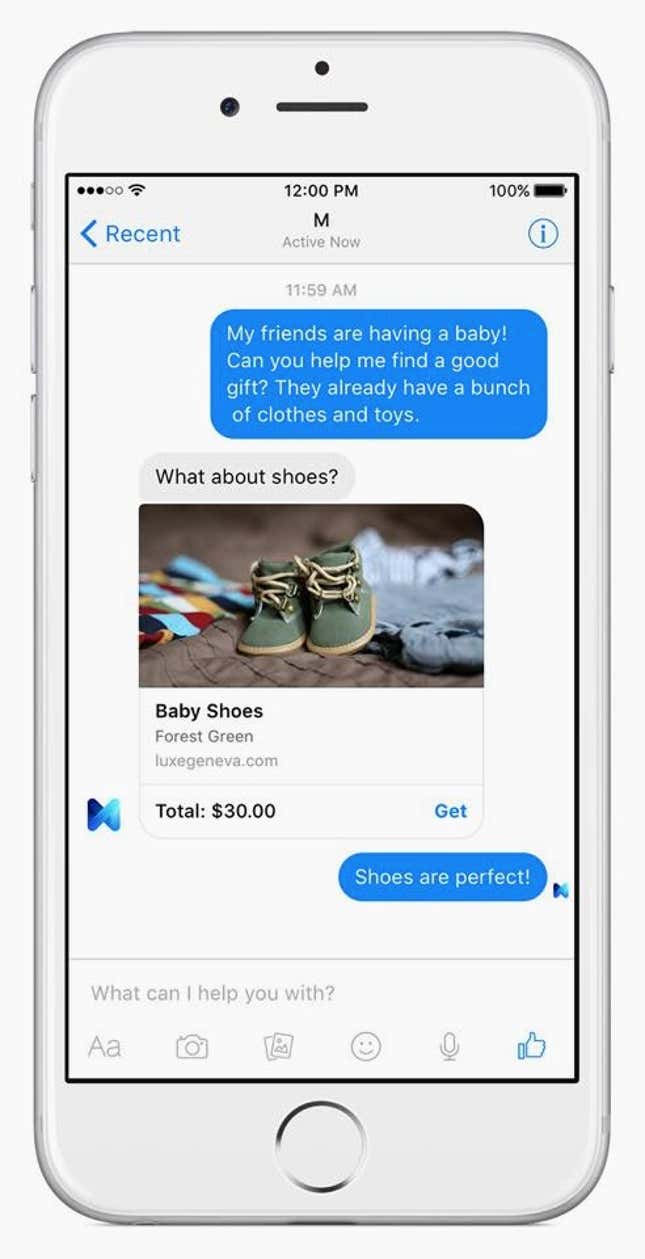Robots aren’t smart enough to do our jobs. Unless, of course, we teach them how.
In August Facebook launched “M,” a virtual assistant built in to its Messenger app. It’s like Siri, but with a fleshy twist: Actual humans oversee M’s responses and add extra information, even making phone calls and doing extra research, to make sure the answer is personalized and on target.
But these human overseers are not likely to be in control forever: Facebook plans to use their decisions to help M make better choices of its own. This is the artificial-intelligence equivalent of training a younger, cheaper, faster replacement to do your job.
M is only available to a few hundred users in San Francisco, so there hasn’t been much information on what this cyborg is capable of. But yesterday Alex Kantrowitz at BuzzFeed got access to M, and found it to be every bit as helpful as a real human.
In that impressive exchange M appears to do the initial work on its own, but by the end it’s pretty clear that humans have taken over. M’s responses include things that Siri and her robot peers have lots of trouble with, like combining information from multiple requests (mentioning Snapchat then later BuzzFeed), picking up on vague hints (Kantrowitz doesn’t directly ask for the BuzzFeed definition), and using implicit information (the sender’s name). Another exchange shows a mastery of colloquial language that would be uncanny for a machine:
One reason these exchanges are so impressive is that without humans, AI can be pretty bad, often seeming to completely misunderstand simple ideas. Some of Kantrowitz’s other M tests, which appeared to be primarily machine-driven, did not go so well. And in others that went better, there were tell-tale delays.

But AI is improving, thanks to improvements in raw computational power and algorithmic efficiency. One big advancement is in deep learning, a technique for recognizing patterns in enormous amounts of data.
For deep learning to work, of course, you need said enormous amounts of data. In the case of Facebook M, that is going to come partly from the very humans that are employed to make sure it works.
These human trainers—contractors employed by Facebook—don’t just help M respond, they also record the steps they took to produce those responses. “Everything the trainers do, we record every step,” Alex Lebrun of Wit.ai, a language-processing startup acquired by Facebook, told Wired in August. That recording is important, because it allows Facebook to convert human decisions into data. That data can then be pumped into M’s deep-learning algorithm to help it find patterns it can use to replicate those decisions, with less or no human help.
Automating the subtlety in the above conversations is a long way off, even with advances in deep learning and Facebook’s tremendous resources. Lebrun told Wired that the company plans to continue using human trainers for years. A separate Wired piece cited Facebook’s David Marcus as saying that it may employ thousands of contractors to train M, which it noted would “represent a substantial economic investment.”
Still, the only reason for Facebook to make that investment is the hope that, with enough data and technological improvements, these contractors will one day train themselves out of a job. Their robot recruits are eager to learn.
